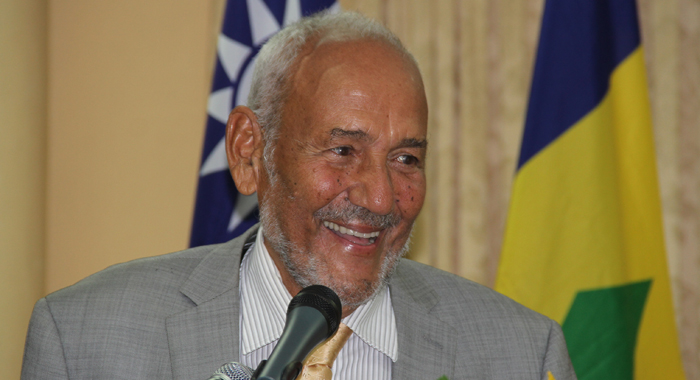Former Prime minister Sir James Mitchell has suggested a simple reading of the section of the Constitution that speaks to how Parliament should handle motions of no confidence.
Parliament spent three hours on Jan. 31, debating how it should proceed with the motion of no confidence brought by the main opposition New Democratic Party, which Sir James founded 40 years ago.
The relevant section of the Constitution says:
- (2) a. If notice in writing is given to the Speaker signed by not less than three Representatives, of a motion of no confidence in the Government the Speaker shall (i) if the House is then sitting or has been summoned to meet within five days, cause the motion to be considered by the House within seven daysof the notice; or
(ii) if the House is not then sitting and has not been so summoned (and notwithstanding that Parliament may be prorogued) summon the House to meet within fourteen days of the notice and cause the motion to be considered at that meeting:
Provided that if the House does not, within twenty-one days of the notice, meet and dispose of the motion the Clerk of the House shall summon a special meeting of the House at such time and place as he may specify for the purpose of debating and disposing of the motion.
In his attempt to convince House Speaker Jomo Thomas that the motion should not be debated, Prime Minister Ralph Gonsalves said that the opposition needed the support of the majority of the house for the motion — which was signed by all seven opposition lawmakers — to go to a vote.
Gonsalves argues that “consider”, as used in the section, does not mean “debate”, while the speaker, who ruled against the Prime Minister, said that his understanding is that “consider” and “debate” were used interchangeably.

Commenting on Boom FM on Wednesday, Sir James said that he was involved in the production of that section of the Constitution during St. Vincent and the Grenadines’ Statehood years.
He said that “consider” is a very simple word that needs no special legal or constitutional interpretation.
“You could consider something in your mind. You could consider something in speech. And it’s either you consider something in your mind and you are silent or you consider it and demonstrate that you are considering it…
“Like you, now I am considering the word consider. But I can’t have you read my thoughts about what I am considering.”
Sir James said that “dispose” is also a very relevant word.
“Because if you bring a no confidence motion, it has to be disposed of — not ignored not brushed aside. That is plain, simple language. It does not need a constitutional expert,” he said.
“The situation is very, very clear. A no confidence motion has to be considered and it has to be disposed of. It says here in that same section 47(b) ‘to dispose of’… So you consider by debating and at the end of that, somebody has got to call for a vote and you dispose of it. You don’t dispose of it by not addressing it.”
After the speaker ruled that majority support was not needed for the motion of no confidence to go to a debate, he allowed a government amendment that turned the motion in a motion of confidence in the government.
He later said that he “erred” in that decision, a position that Sir James also holds.

But Sir James said that Gonsalves was not wrong in the way he acted in Parliament.
“Prime Minister Gonsalves is right to defend his government. Now, there is a difference between right and erred. You are looking to see who is right and who is wrong? What is the end result? If you’re in government, you protect your government and you use every trick in the pack to protect your government, to avoid making sure that certain statements are not aired and the people are not educated about the facts.
“That’s part of the procedure, if you want. But, at the same time, if you are democracy, you have to understand that justice delayed is justice denied. Truth delayed is truth denied. Let the facts be discussed, let the facts be exposed, and parliament is the place to hear all sides and let the Parliament decide who win and who lose.”
Regarding the Speaker’s comments on social media, Sir James said this is a similar tangle as it was with the government seeking reparations for genocide and slavery.
He said some persons would be satisfied with an admission of guilt, while others would want an apology.
“So if you admit that you are wrong and you don’t apologise, it shows that you are really protecting yourself.”
Sir James said he would take it further and would not recommend the opposition rush and bring back a motion of no confidence.
“And they can bring it back. You can bring a motion of no confidence every Monday morning, you know,” Sir James said.
“I will like the motion of no confidence to be hanging out there and don’t relieve the speaker, don’t give him an opportunity to correct himself, and let history know that he made a booboo this time.
“You could always come back [with another motion of no confidence but leave him hanging with his own words and his own verdict on himself and his own inadequacy… when you say you were wrong but you don’t want to apologise. Come on! What kind of balls do you have?”
Regarding the government’s statement that it will ask the court to interpret the section, Sir James asked if it was to get a judgement in 20 years, noting that in his case regarding the Ottley Hall commission, he had to wait 12 years for a final judgment.
He said that, in his view, the opposition could have gone to court to get a declaration that the speaker was wrong, but he has already so admitted.







This all shows that we have a very messed-up government that is tripping and falling over its own bureaucratic stupidity and corruption. Mitchel calls it “tricks” but when it pertains to the Constitution and the people’s business most would call it corruption.
Corruption: illegal or unethical behavior conducted by a person or persons in an official position.
I believe Thomas Jefferson was correct when he said something to the effect, that the longer a government stays in power the more corrupt they become.
Evidence please that the way the non-confidence issue was handled is an example of political corruption.
corruption: illegal or unethical behavior conducted by a person or persons in an official position.
I believe ignoring a law constitutes “illegal”. When the law says an official must do something and they do not, that is considered, by the definition, corruption. Those (lawyers are actually in an official position because they take an oath to uphold the law, just as a police officer) that help a Prime Minister bastardize laws in the Constitution is also corruption. Or do you think it is a great thing?
Lostpet, you are obvious not in St. Vincent so you could not be familiar with all the newspaper articles that have debated this issue clearly showing that Mitchell’s and the leadership of the NDP on the non-confidence motion are incorrrect.
But you have access to the Internet where the Constitution is posted in full at several sites and can read the relevant sections for yourself after which time you are free to make an informed judgment which you can share with us. Unless you do so, your position on the issue is just hot air.
C. ben, please read the latest statements by Sir James Mitchell, and Godwin Friday’s response to Ralph Gonsalves’ letter. As you see those corrupt lawyers that came out after the unwise parliament walk-out actually make a case for the opposition, then they ignore everything they originally stated and make an extreamly weak case… after stating their own eveidence is inadmissable based on how clause 47 is worded! In my oppinion they make themselves out to be total idiots and think that everyone else is too. I cannot believe you have fallen for it! You do not have to be a lawyer to understand. You suggest I read the Constitution, I suggest you do the same!
Mitchell is dead wrong on this issue, as the views of several constitutional experts, including two card-carrying NDP party members, have clearly shown.
From a legal point of view, “consider” means “to look into something” which, in this case, can mean postponing the debate of a motion to at a specific point down the road while “debate” means to argue about that same issue at a specific point in time. The fact that the motion is postponed for debate does not negate the fact that is it under consideration.
The NDP knows this and will therefore not challenge it in court to make themselves look like asses.
c. ben-David, there was a motion of no-confidence in the government which was preempted by an amendment of a motion of confidence. How can you postpone (under consideration) the debate of a motion of no confidence down the road if there is already an amendment, passed, of confidence? Does that make sense to you?
Sir James is spot-on with his analyses of the actions that took place in parliament.
The constitutional experts are all mum at the moment because take a plain and simple matter and turn it into a “difficilis”
David for heavens sake why don’t you just stop trying to be something you are not, you write such crap and actually know nothing about what you comment.
C. ben, you are saying that ‘consider” does not mean debate? So, how does a parliament ‘”consider” something if they do not talk (debate) it? Why is it explicitly stated that a no-confidence issue MUST be considered? Sir James was there and involved when the clause was written but you say he is wrong about the meaning? Come on now C.ben your extreme bias against the NDP is really obvious on this one. You are so good about your info on the airport and tourism but I am in shock on how little you know and understand about this!
The views of Sir James Mitchell and the NDP are correct. St. Vincent’s constitution is a product of rich democratic parliamentary procedures common in the British Commonwealth.There is no dispute about motions of no confidence. They are to be debated and voted on by the parliament and disposed of in this way. A survey of speakers around the world in all Western Democracies would come to the same conclusion. Our speaker has already admitted that he made an error in the way he handled the motion of no confidence and is expected to make corrections the next time around. The action of our parliament puts us in danger of being expelled from the Commonwealth. We must change course if we are to retain our position as a democratic nation. Additionally, the challenge to the 2015 election results needs a speedy resolution as the unusual delay indicates an erosion of our democratic principles.
Well said. I wish I had written your comment!